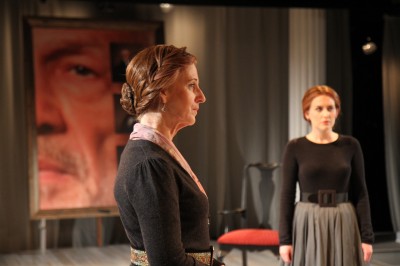Mourning Becomes Electra
By Eugene O’Neill
Adapted by Gordon Edelstein
Directed by Timothy Douglas
Produced by Remy Bumppo
At the Greenhouse Theater Center, Chicago
It is not a lack of love, but a lack of friendship that makes unhappy marriages.
– Friedrich Nietzsche
Love; revenge; fate; power; reputation; lust; hatred; murder; self-affirmation. Eugene O’Neill’s Mourning Becomes Electra is a warhorse and a powerhouse. It is immense. It is puissant. It is trenchant. It comes in with an agenda of dynamite, blowing everything in its path away. It is truly American; and yet its heart – like the heart of democracy itself – lies in Athens.
 O’Neill’s adaptation of Aeschylus’ Oresteia is dedicated to its predecessor; even when it varies from the original’s course, it is grateful to it – in awe of it. And it commands the airs of it. Really, Mourning Becomes Electra is more Greek than any of Shakespeare’s tragedies: it is fate, again and again, who intervenes. And yet, perhaps it is more a synthesis of the pre- and post-Christian ideas of tragedy. There is the inevitable, the curse upon the family. But it is also driven by individual psychology. There are the great tragic flaws within each character that helps them toward their end.
O’Neill’s adaptation of Aeschylus’ Oresteia is dedicated to its predecessor; even when it varies from the original’s course, it is grateful to it – in awe of it. And it commands the airs of it. Really, Mourning Becomes Electra is more Greek than any of Shakespeare’s tragedies: it is fate, again and again, who intervenes. And yet, perhaps it is more a synthesis of the pre- and post-Christian ideas of tragedy. There is the inevitable, the curse upon the family. But it is also driven by individual psychology. There are the great tragic flaws within each character that helps them toward their end.
 What makes this play great – and what makes it a tragedy – is that each and every character wills for good. There exists no one with evil in their heart, a wish simply to harm out of malice. Each person wants what is best – for themselves, for the family, for the greater good. They seek what is just. But what is “best,” what is “just,” is not always – ever – agreed upon. And so a woman tied to a marriage with a man whom she does not love cannot pursue her dream of true love; a man who has always been cold cannot rekindle a relationship with a woman he has always loved, in spite of his lack of affection; another man, bent on revenge, accidentally finds happiness . . . . The results of this are that the audience cannot fault anyone for their actions. All of the characters behave in a justifiable manner. And yet each deserves what they get – each person is deserving of his or her fate. Indeed, each one who embraces their fate shows what strength they have. They are, in that moment, glorious, regardless of what is to – what must inevitably – follow.
What makes this play great – and what makes it a tragedy – is that each and every character wills for good. There exists no one with evil in their heart, a wish simply to harm out of malice. Each person wants what is best – for themselves, for the family, for the greater good. They seek what is just. But what is “best,” what is “just,” is not always – ever – agreed upon. And so a woman tied to a marriage with a man whom she does not love cannot pursue her dream of true love; a man who has always been cold cannot rekindle a relationship with a woman he has always loved, in spite of his lack of affection; another man, bent on revenge, accidentally finds happiness . . . . The results of this are that the audience cannot fault anyone for their actions. All of the characters behave in a justifiable manner. And yet each deserves what they get – each person is deserving of his or her fate. Indeed, each one who embraces their fate shows what strength they have. They are, in that moment, glorious, regardless of what is to – what must inevitably – follow.
Indeed, the moment that Lavinia . . . but perhaps we are getting ahead of ourselves. Mourning Becomes Electra, like the Oresteia, is a trilogy; however, Remy Bumppo has produced an adaptation that cuts each play into a single act, roughly an hour in length. The plot follows a modern-day house of Atreus, the Mannons. Ezra Mannon (David Darlow), taking the place of Agamemnon and the head of the household, is returning from the Civil War to his wife, Christine (Annabel Armour) – that is, Clytemnestra. Their daughter, Electra – that is, Lavinia (Kelsey Brennan) – awaits her beloved father, while Orestes – or rather, Orin (Scott Stangland) – who has always been his mother’s son, has been injured and is to return shortly. The siblings have been courted by their neighbors, Peter and Hazel Niles (Luke Daigle and Stephanie Chavara, respectively). But war, as it is wont to do, has changed the men returning home. Ezra seeks to rekindle the love between him and his wife; and Orin has seen so much death and killed so many, he has fallen into a deep melancholy. Anyone who knows the story of the house of Atreus is familiar with the dire fates awarded all of these players.
 Yet each individual shows a powerful self-affirmation before their fate. Indeed, when Lavinia is chastised, told that she should seek forgiveness by a priest, before God, she stands resolute – “I have forgiven myself,” she says. This is a powerful statement. It is the individual taking hold. She needs no gods, no priests, no outside, higher force giving her permission and allowing her to be so; she is able to do it herself: she has become her own revaluator of values, she has become, in a sense, an Overman. And when she accepts the fate she has been given – the cards dealt her before her birth, to which she must succumb – it is a heroic gesture. She could have gone down a dark path – an easy path, one right before her feet; but instead she embraces what must be and by owning it becomes more than she had ever been before, even if her fate is a sad and cruel one. The amor fati which she demonstartes is incredible.
Yet each individual shows a powerful self-affirmation before their fate. Indeed, when Lavinia is chastised, told that she should seek forgiveness by a priest, before God, she stands resolute – “I have forgiven myself,” she says. This is a powerful statement. It is the individual taking hold. She needs no gods, no priests, no outside, higher force giving her permission and allowing her to be so; she is able to do it herself: she has become her own revaluator of values, she has become, in a sense, an Overman. And when she accepts the fate she has been given – the cards dealt her before her birth, to which she must succumb – it is a heroic gesture. She could have gone down a dark path – an easy path, one right before her feet; but instead she embraces what must be and by owning it becomes more than she had ever been before, even if her fate is a sad and cruel one. The amor fati which she demonstartes is incredible.
Indeed, even when the production falls short, for one reason or another, its failings are so great – so sprited – that one cannot wholly fault them for it. After all, great men’s failings are more useful than small men’s triumphs. And I may be in the minority on this – gladly – but I found much of the acting . . . just a touch off, somehow. It was somehow askew, even though I cannot exactly put my finger on how or why. The best I can describe it is: when the play seemed to ask for a stylized form of acting, the director seemed beholden to realism. Perhaps this is not exactly fair: after all, Mourning Becomes Electra is one of the first American Realist dramas. But some of the lines – a fair amount, actually, in almost everyone’s mouths – felt stilted. There was – yes, this is it – there was an artifice there that the play seemed not to call for, perhaps. And yet the emotions were so raw, so real. Indeed, even if one does not wholly agree with the direction of this piece, one cannot fault that direction for its depth of vision and its ambition. The play is an epic, and it deserves an audience.
Recommended
Will Fink
Reviewed on 9.26.11
For full show information, visit TheatreInChicago.
At the Greenhouse Theater Center, 2257 N. Lincoln Ave., Chicago, IL; call 773-404-7336 or visitwww.remybumppo.org; performances Wednesday through Saturday at 7:30, Sunday at 2:30; tickets $20-$60; running time 3 1/2 hours with intermission; through Oct. 30.

